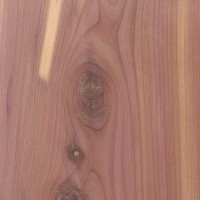 |
Common Name(s): Aromatic Red Cedar, Eastern Redcedar Scientific Name: Juniperus virginiana Distribution: Eastern North America Tree Size: 100-115 ft (30-35 m) tall, 3-4 ft (1-1.2 m) trunk diameter Average Dried Weight: 33 lbs/ft3 (530 kg/m3) Specific Gravity (Basic, 12% MC): .44, .53 Janka Hardness: 900 lbf (4,000 N) Modulus of Rupture: 8,800 lbf/in2 (60.7 MPa) Elastic Modulus: 880,000 lbf/in2 (6.07 GPa) Crushing Strength: 6,020 lbf/in2 (41.5 MPa) Shrinkage: Radial: 3.1%, Tangential: 4.7%, Volumetric: 7.8%, T/R Ratio: 1.5 |
Color/Appearance: Heartwood tends to be a reddish or violet-brown. Sapwood is a pale yellow color, and can appear throughout the heartwood as streaks and stripes.
Grain/Texture: Has a straight grain, usually with knots present. Has a very fine even texture.
Endgrain: Resin canals absent; earlywood to latewood transition gradual, grain moderately uneven to moderately even; tracheid diameter small to very small; zonate parenchyma (double ring).
Rot Resistance: Regarded as excellent in resistance to both decay and insect attack, Aromatic Red Cedar is frequently used for fence posts used in direct ground contact with no pre-treating of the wood.
Workability: Overall, Aromatic Red Cedar is easy to work, notwithstanding any knots or irregularities present in the wood. It reportedly has a high silica content, which can dull cutters. Aromatic Red Cedar glues and finishes well, though in many applications, the wood is left unfinished to preserve its aromatic properties.
Odor: Aromatic Red Cedar has a distinct and tell-tale scent: the wood is commonly used in closets and chests to repel moths and other insects.
Allergies/Toxicity: Although severe reactions are quite uncommon, Aromatic Red Cedar has been reported to cause skin and respiratory irritation. See the articles Wood Allergies and Toxicity and Wood Dust Safety for more information.
Pricing/Availability: Large and/or clear sections of Aromatic Red Cedar are much less common, but smaller, narrower boards with knots present are readily available at a modest price.
Sustainability: This wood species is not listed in the CITES Appendices, and is reported by the IUCN as being a species of least concern.
Common Uses: Fence posts, closet and chest linings, carvings, outdoor furniture, birdhouses, pencils, bows, and small wooden specialty items.
Comments: Although Aromatic Red Cedar is included in the cypress family (Cupressaceae) which includes many species of cedar, it’s perhaps more closely related in junipers in the genus Juniperus. In tree form, it is more commonly called Eastern Redcedar, while the wood itself is usually referred to as Aromatic Red Cedar.
Though Eastern Redcedar trees are widely distributed throughout the eastern half of the United States, it is a very slow-growing species, and most trees harvested tend to be fairly small in diameter. Because of this, Aromatic Red Cedar boards tend to be knotty and narrow.


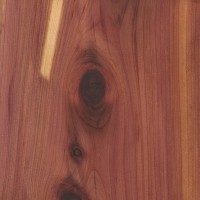
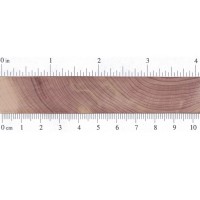
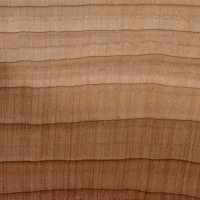

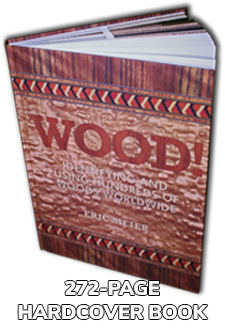

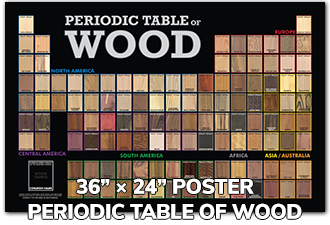
Hey Eric, I noticed you might not have any Bermuda Cedar (Juniperus Bermudiana) in your collection? Makes sense since it’s still endangered and not exactly on shelves. I lived in Bermuda for a while in the late 80’s / early 90’s and during those years, a 50+ year old Bermuda Cedar fell on our property in Southampton. It was one of the 5% that survived the 1946-1953 blight that wiped them out. The tree had some insect damage but not enough to kill it. Makes me think this may have been one of the naturally resistant survivors. Anyways it’s a… Read more »
Thanks for the info, I wasn’t aware of a past blight.
I actually do have a sample of Bermuda cedar, which according to my records was acquired by Dick Bunner back in May 1969. It’s in my backlog of samples to be added (along with about 2000+ other species), so it should show up on the site in a matter of time…
I think I am working with Red cedar due to the strong cedar smell and color but the wood is quite hard. There is hard white substance in the capillaries of the wood that caused me to abandon the piece. does anyone know what it might be?
Is the wood really that purple in person? It looks like purpleheart to me. I once had a piece of purpleheart that had a strange odor, but I wouldn’t call it cedar-like.
Definitely not cedar. Could be cumaru.
To me, it looks like one of the “redwoods” from SE Asia: kempas, keruing or kapur. It was a common flooring material for a while and also was coming into the U.S. as wheelbarrow handles and on wheelbarrows (’cause the U.S. makers were using it). One of the ‘field marks’ of tropicals is that the ‘grain lines’ often don’t run continuously across the plane of the wood, but show up instead as short lines. Also, most often, the lack of any knots. These appearances are due to two reasons: 1) tropical hardwoods typically are growing all the time, with no… Read more »
It’s pitch
I harvested several aged cedar logs from my property and had them milled 7”x7” for my deck posts. I poured a concrete footer for each post. The sun has bleached the color that was beautiful when I got them from the sawmill. These are eastern red cedars. What can I do to bring back the natural color and what the best UV protection?
It can be effectively and repeatedly stained to retain the color
I cut some Eastern redcedar from freshly cut log video on my band saw and left it for the night in my basement when I came back the next morning it had these crystals growing out of it does anyone know what this is
Shame no one replied to you. I also don’t have the answer, but I HAD to add that that looks beautiful!
It is the cedar chemical hardening. Think of pitch from pine or spruce coming out the wood, same idea
It’s the sap in hardened form, called resin.
i see where people are using as a charcuterie/serving board (aromatic)…is this not toxic?
Non-toxic but not recommended for woodenware by most sources I can find. I haven’t seen an explanation as to why not, but I believe the conventional wisdom is generally against using softwoods for woodenware.
Thanks. Yes makes sense.
I think the smell would be overpowering and unpleasant. It smells like mothballs and seeps into everything around it.
It’s not used for serving or cutting boards because it’s too soft and will show every fork or knife mark but is often turned into bowls or lidded boxes so could be used however I have seen oval cookies used as charcuterie boards and centerpiece bases. As far as smell I have several pieces in my shed and even put right up to my noce the rough lumber can barely be smelled where as one piece of rough Spanish cedar I put in my garage left a very prominent but pleasing smell in less than 24 hours. also once seale… Read more »
To be clear, ERC does not smell like mothballs, which are made with napthalene or paradichlorobenzene, both of which are toxic to humans. Perhaps the reason Robin associates the smell of ERC with this is because ERC is often used to line closets and certain the lining of cedar chests (in which people have also put mothballs!). ERC has a strong smell of cedar, often use for gerbil bedding and other things because a lot of insects find it repellent (the extractives in ERC are a result of the epic evolutionary battle between plants, and insects that eat them). Almost… Read more »
not toxic, but high natural oils an such make the glue joints less than ideal for cutting boards. I think thats the main reason cedar isnt recommended.
anyone know the design values Fb, Ft, Fv, Fc, E, for Eastern Red Cedar??
Hi. I have a cedar slab for a table top. It comes from a saw mill so it’s still rough. How should I sand it and what clear coat should I apply that won’t yellow? It has knots, one goes all the way through leaving a hole. It is a live edge with some bark still attached. I’d like it to be glossy to be easy to dust. Thanks in advance for help.
Use epoxy, plain and simple.
Do not put a finish on cedar that is not dry. Dry is considered about 7% moisture in cedar. So…no gluing until it cures. Might take two years to air dry. Then there are waxes and rub in finishes that work fine on cedar. But, because of the oils in the wood, many finished never fully dry
Is commonly-available aromatic cedar suitable to use to construct a pinched-toe coffin?
If so, would 3/4″ plank thickness generally be sufficient?
I would wonder if redcedar would keep the body from breaking down as quickly as it could.
I’ve used 5/8 planks for large areas, and found it splits very easily– so nails near end of boards problematic
I’d say the formaldehyde will make whatever the cedar does negligible to the body’s decomp.
I build tree houses and work in an area where there are lots of Aromatic red cedar. Would you recommend using it for posts to hold up the tree house? Any tips on how I should bury them in the ground?
Red cedar is an excellent choice for this application, but you have to make sure you use the red portion of the tree below ground. The red portion is almost rot proof and will lay a long time, but the white part will rot quickly.
I would like to use 8x8x10 eastern cedar posts to support the front of a porch. I was just told they might not not be very durable in this application. Would love some feedback. I can use western cedar but it is not near as pretty. These posts will be set in concrete. Thoughts?
Best if the end of the post to be set in concrete is all red heartwood. We do that very frequently and have excellent results. We have used ERC for porch columns for many years and definitely prefer them over WRC. ERC does not split and open up like WRC.
I hate working with cedar because in my experience it is so very fragile and weak to loads but I love how it looks. Here is a chart I carved out of cedar. I didn’t want it smooth and I used linseed oil ad the finish
I meant to say heart. Also it looks nice on pens and can be turned extremely fast but I still would not recommend for large projects due to its fast cracking and easy damage.
which varnish would I use so I don’t lose my pink color on a grandfathers clock
It’s been my experience that the pink color inevitably fades, and seems to do so faster than most other colored woods. Maybe someone else can chime in though…
I’ve used cedar for bowls, which is a great application. Bowls finished with shellac fade to brown over a couple of months. My preferred technique is Danish Oil first then sealed inside and out with a high quality oil-based poly. I’ve had great luck retaining the color. I suspect it’s a matter of not letting it “breath” but I don’t really know.
I realize I’m answering this three years after the fact but when I want to keep wood from UV aging I’ll use the the Rubio naked oil which preserves the color and keeps the wood from darkening as a normal finish would. Let it cure for a few days, sand lightly and apply shellac as a primer. After that you can apply a water based poly with a Uber inhibitor. Nothing is impervious but I’ve got a cedar blanket chest that’s about five years old and it still looks freshly milled. Ditto for cherry casings, jambs and sills in a… Read more »
I want to use red cedar for building recording studio furniture… console desk, rack cabinets, etc.
Parts of each project will not be easily visible, and it seems like a shame to waste red cedar on the “invisible” parts of the furniture.
I am wondering what other woods that are more plentiful and less expensive can be used along with the red cedar? Will I run into issues with glue adhesion, edge joinery, or warping?
Thanks!
We have an enquiry for Red Cedar to be used in a museum for shelves.
1200mm wide x 600mm deep x 25mm thick to support a load weight of up to 30kg.
Our client has asked if Red Cedar has similar properties to the American Lime and if you have any experience of the Red Cedar being used within a Museum Collection ~ if so where?
American Lime is often used for Entomology trays in museums.
I used to have a sawmill and harvested my own red cedar lumber, air dried it, and used it to make furniture. I tried several methods of finishing and found that so far the best, cheapest, and easiest finish on red cedar furniture is clear spray paint in a can! Use a light coat to seal, dries very quickly. Lightly fine sand and use a tack rag between coats and stack layers of coats until you get the desired finish and avoid overspray on finished areas. The main reason that the pinkish color of this wood goes amber is mostly… Read more »
First comment, big fan of the hard work behind this site!
I harvested some eastern red cedar while cleaning up a private family cemetery plot. I made a bunch of these wine goblets for family keepsakes. This was a dream to turn while green, though because of the knots I would not turn small cedar logs when dry. Just a guess, but I bet the knots would make your project explode.
Some more pics
Hi guys, I have a bedroom suite and I’ve been told that it’s r3e cedar however when I looked up the maker Beith Scotland I found they mainly used mahogany. Can you tell from these pics what wood it’s made out of?
Hi. I can’t say for certain that it’s mahogany (although it looks like it). But I do know it’s not aromatic cedar. Hope that helps. I work with cedar a lot. It looks nothing like your piece.
I just lined my closet with Cedar wood that was stored in a cottage (still in original) boxes. Some of the wood has crystals all over it and doesn’t apear to have much fragrence. I think the wood is just dried out. What oils can I use (besides cedar oil which I have) to get some moisture into this wood?
I happened upon HOWARD Feed-N-Wax Wood polish and conditioner a while back and love it. I also get softer hands when done working with it. Also has a great citris smell.
Best of luck finding the right one for your needs.
C.G.
I would re-oil using a cedar oil. Giles & Kendal makes such a produck
The chemical compound in cedar oil that is toxic to insects is called “cedrol.” You want this in your cedar. I found this on a site selling cedar oil: “NOTE: Cedrol is a component of Cedarwood oil that can crystallize. If this happens, gently heat your Cedarwood oil in a hot water bath to return it to liquid consistency.” So you have plenty of cedrol in your cedar, it’s just crystallized from the cold in storage. I’d try heating up the closet (maybe with a space heater, or a heat gun if that doesn’t work) until the cedrol crystals liquify… Read more »
Apart from fading i colour when exposed to light (not a problem in a closet) it also mellows out in odour neither of these change it’s properties to keep moths and bugs away and in a closed closet you will most likely always notice the scent. As I mentioned above I put a 6′ x 24″ x2″ rough Spanish cedar rough board in my garage/workshop and it was very noticeable though not unpleasant by the next day. In contrast I have bought 3 lots of ERC this summer (some last Thursday) and even with 50 or more bf in my… Read more »
It did catch my attention when you said that aromatic red cedar is commonly used in the construction of fences, closets, and outdoor furniture. My husband said that he wanted to install wood fences in our yard, so we’re looking for a type of wood that will suit what we need. I will make sure to find a cedar lumber supplier that offers aromatic red cedar woods. Thanks!
I am looking to seal the red Cedar also I have use polyurethane in the past but in time it got darker I don’t want to lose the bright reddish pink color switch to water-based Polyacrylic I would like to be able to in Rich that beautiful color and not lose it if you have any knowledge on how to keep it reddish thanks Adams
Adam,
Have you tried epoxy?
We use it every week on our cedar. Looks beautiful.
Adam, here a link to Minwax crystal clear finish. No ambering. https://www.minwax.com/wood-products/clear-protective-finishes/interior/minwax-one-coat-polyurethane
Cedar is not subtable for flooring. It works OK in your closet, but even there it’s still lacks durability. I have never tried installing it over concrete because I liked getting payed and direct glue down to concrete is a grate way to loose money even if you do everything right. I will have to guess what it will do. The changing temperatures of the room will cause the wood to expand and contract to the point were the wood will septate it’s self from the glue. The rest of the questions are starting off so wrong that ill just… Read more »
Would eastern red cedar be a good alternative to black cherry or teak for acoustic purposes, such as a speaker enclosure?
Thank you for this I had a strange red STRONG smelling peice of wood and I was wondering what it was. It was the Aromatic Red Cedar. It was SO strong I sanded it and turned it into a stick of deoderent. LOL :P
I was wondering if red cedar can be used in electric guitar making.And if so what part of the guitar it is best suited???
You can make the neck of the guitar with cedar but you need to choice a part of a cedar lumber without knot and you need to put a 1/2 inches to 3/4 inches piece of a solid wood like hard maple, rosewood or ebony into the center of the neck(laminated with the cedar) with the grain of this wood perpendicular to the grains of the fingerboard(the grain of the cedar parallel to the grain of the fingerboard) or a truss rod or a metal bar under the fingerboard to assure than the neck is not arch with the strings… Read more »
3-5 thin coats of rub in polyurethane work great on sealing this wood and only enhance the colors. Its also relatively cheap.
I am told I can affordably rebuild my entire back deck out of Eastern Red Cedar. Currently it’s 2 × 8 framed with 2 x 6 floorboards. Supported om 4 x 6 columns. The railings utilize all 2 x 4, 2 x 6 and 4 x 4 posts. It’s all butt ugly and in the shade and northern exposure in Northwest Arkansas. Lots of humidity too. Question: Would I benefit from replacing in all cedar with the exception of changing out the horrid railing from construction site style horizontal 2 x 4 railing to 2 x 2 cedar spindles? I… Read more »
ERC works Great for decks, pergolas and outdoor furniture. Seal with Messemer’s UV-PLUS to lock in the color otherwise it will weather to a nice silver color and retain that color for many years.
We manufacture and build many outdoor projects with ERC and have tried numerous different sealers. UV-PLUS works best for us.
Quick question Gail – is there a specific color of the UV-PLUS specifically for ERC for best color retainment? I’m guessing “natural”, but it appears there are different choices.
Can Red Aromatic cedar be used as a butcher block or as a counter top? If so what would you use and how to finish?
I honestly wouldn’t recommend it for butcher blocks as it’s pretty soft. But if that’s not a concern for you, then go for it. You could just finish it with mineral oil, just let it soak in, then wipe off excess.
Cedar has higher toxicity than other woods. It’s not a good choice for cutting boards…
Greg I put cedar t&g flooring in our bathroom about a year ago. But I put it over a plywood sub floor and put polyurethane on top,so far so good. I dont know about the adhesive, you could attach strips to the floor with concrete nails and the attach the cedar to that.
CATHERINE DOES TNE CEDAR HACE THE BARH ON IT THERE IS A LOT OF SAND IN THE BARK.
Can I use Aromatic Red Cedar in living rooms. Thank You. Vytas
Catherine,
I’d recommend a different blade. Bi-metal blades are pretty affordable, and seem to last a good while longer than regular steel blades. I really like Lennox Die-Master 2 series of blades. Otherwise, if you really want to get something nice, look into carbide tipped bandsaw blades, though they will easily run $100 – $200 per blade.
I have noticed a significant dulling of my band saw blade when I cut bowl blanks from cedar. I assume this is due to silica build up. What is the best way to minimize dulling of the blade?
It might be a little late for an answer but I’ve read that debarking the trunk with a draw knife is supposed to help.
Kyle, I’ve had the very same experiences with oily tropical woods too. I have a feeling that the oils in the wood somehow change the chemistry of the finish, so that polyurethane and other reactive finishes simply will not cure… ever. They just stay gummy. Again, sealing with several coats of shellac seemed to remedy this, and allowed me to then use polyurethane as a more durable topcoat. (I really should write an article about all of this.)
In my experience red cedar likes evaporative finishes like shellac or lacquer much more that curative finishes like any sort of oil based product. Linseed oil, polyurethane, spar varnish and such can remain tacky for a long time or adhear poorly due to red cedar’s high resin content. That’s why it has a strong smell. Same goes for “heart pine” as far as finishes, especially if the wood has streaks of “fat lighter” in it. If a wood has a strong “resiny” smell use shellac or lacquer. You can also seal the wood with a dewaxed shellac and then pile… Read more »
I have never had any issues using a Marine Spar Varnish on any type of Cedar….and I have made hundreds on Hope Chest.
Bill, a lot will depend on how much durability you’re after, and what type of look that you want. You could use Polyurethane for better protection, and if you only use a few coats of satin it could still look natural. Otherwise pile on some glossy coats for maximum protection.
For the most minimal finish, you could just seal it with shellac. I prefer to mix my own, but I know Zinsser SealCoat is a good product; just make sure the date on the bottom of the can is less than a year old.
I made a custom floor in my 49 chevy pickup of 3/8 aromatic cedar t&g and sealed it with linseed oil. The oil picks up dirt and I just finished sanding it back to natural. What can I use to seal this wood? Bill
If it is not exposed to a lot of weather or moisture just apply dewaxed shellac, sand smooth with 220 or 320 and then wax with Johnson’s paste wax. I do all of my drawer boxes this way and it is very nice.